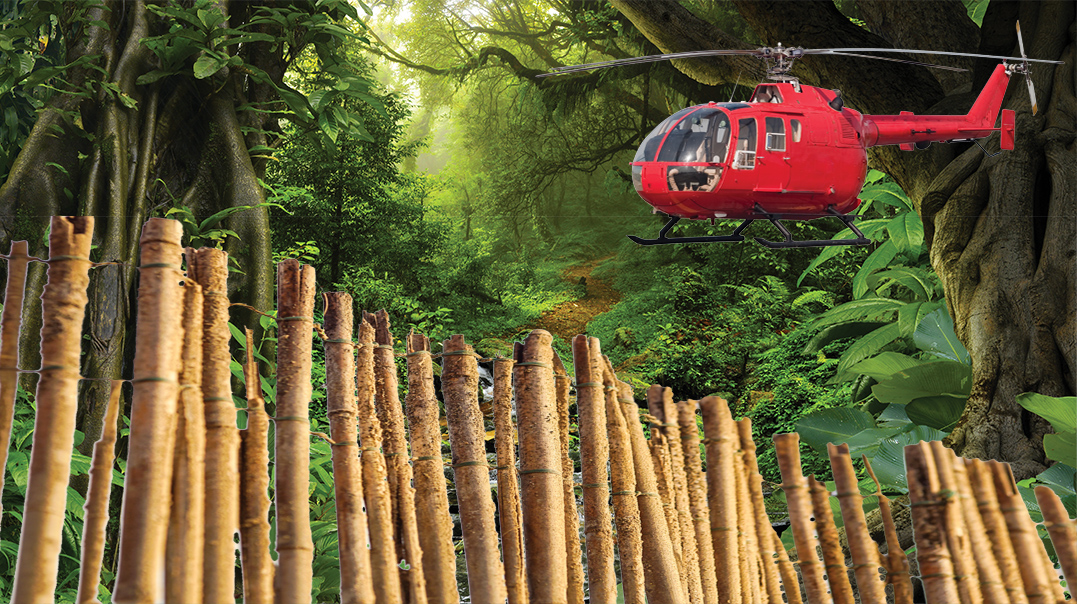Escape from the Jungle

The prisoners bore the brunt of the guards’ hunger and anger. Soon the prisoners resorted to eating anything that moved

First Mission
February 1, 1966
USS Ranger, South China Sea, off the coast of Vietnam
The flight deck of the massive aircraft carrier was a hive of activity as mechanics and pilots got ready for its next flight mission.
Lieutenant Dieter Dengler hopped into his Douglas Skyraider, a small plane used for attacks. It was his very first flight mission since he joined the US Navy as a pilot in an attack squadron. His mission, together with three other pilots, was to intercept an enemy truck convoy near the Vietnamese-Laotian border. It was a pretty straightforward mission, as far as attack missions go.
After flying for two-and-a-half hours, the four Skyraiders neared their target. Just as Dengler was zooming in on the target, he felt a massive explosion. Anti-aircraft fire had hit his right wing. Within seconds, his wing was gone.
The Skyraider did slow cartwheels in the air while more artillery exploded all around. Somehow, Dengler managed to crash-land his aircraft. The plane landed with a bump that threw Dengler 100 feet away from the plane, causing him to lose consciousness.
When he woke up, he spotted a Pathet Lao fighter nearby. Dengler slowly covered himself with his sleeping bag and stayed still and silent. The fighter was carrying a long machete, but he didn’t see Dengler and eventually went away.
Dengler spent the rest of the day trekking through the jungle. He found a suitable place for the night and fell asleep.
At daybreak, Dengler continued his trek through the jungle and managed to find some vegetables to eat in an abandoned hut. As he headed toward an opening in the jungle, he heard the sound of a Skyraider flying overhead. A rescue party had come for him! He raced into the clearing, took off his shirt and waved it around, hoping to catch their attention.
But the aircraft didn’t see him. Instead, Dengler was spotted by a group of Pathet Lao fighters. He ran back into the jungle and managed to evade the fighters for a while. But as he began to run across another clearing, he heard shouting behind him. Turning his head, he stared straight into the barrel of a rifle.
The vicious Pathet Lao troops took him prisoner and marched him through the jungle.
Prisoner of War
February 1966
Hoi Het, Laos
After dragging him through several villages, the Pathet Lao fighters brought Dengler to their superiors, who commanded him to sign a document condemning the United States of America. Dengler adamantly refused. The Pathet Lao were furious and they tortured him mercilessly.
Eventually, the Pathet Lao handed him over to the Viet Cong. On February 14, two weeks after he was shot down, the Viet Cong brought Dengler to a prison at Hoi Het in Laos, which was guarded by the Pathet Lao.
The entire prison was only about 24 square yards. It consisted of two prison huts that were surrounded by a bamboo fence. On the other side of the fence were four guard huts housing 16 guards, three gun-towers, and a kitchen hut. Beyond that was miles and miles of jungle.
The first thing the prison guards did was confiscate Dengler’s shoes. Then he was thrown into one of the prison huts.
There were six other prisoners in the hut. One of them, a tall and handsome American, came over to introduce himself.
“I’m Duane Martin,” he said, “First Lieutenant and helicopter pilot. Got shot down in Laos during a rescue flight.”
“How long have all of you been here?” Dengler asked.
“Two-and-half years for the other guys, and nine months for me.”
The other guys turned out to be another American, Eugene (Gene) DeBruin, an ex-Air Force staff sergeant who had come to Laos while volunteering with Air America (a passenger and cargo airline owned by the CIA). The other four prisoners had also been part of Gene’s aid mission with Air America. They had been shot down in 1963 and this was their eighth prison.
The prisoners included three Thai men, Phisit Intharathat, Prasit Promsuwan, and Prasit Thanee. There was also a Chinaman, called Y.C. To.
Dengler was shocked at the men’s appearance. Their bodies were emaciated and their clothing was threadbare. Some of them had teeth missing. They all smiled at him in greeting, but he saw their suffering in their eyes.
“I’ve got to get out of here,” he stated matter-of-factly. No way was he going to end up looking like that.
The other prisoners were seasoned escapees, having escaped from other prison camps. They advised him to wait for the rainy monsoon season.
“You won’t last two days out there without water,” they told Dengler. Without water, he would soon die of thirst. And besides, the dry ground would make it much easier for the guards to track him.
“When’s the rainy season?” Dengler wanted to know.
It was in five months’ time. A long time to wait.
Biding His Time
There was nothing to do but hunker down and wait for the rain.
Conditions in the camp were appalling. The prisoners suffered from illness and were weak and feverish. To gain more nourishment, they would use bamboo sticks to skewer the rats that ran beneath the huts. By night, the prisoners hands and feet were handcuffed. But Dengler was surprised to see that the others had come up with a way to undo the handcuffs, which allowed them to sleep freely. In the morning, they would quickly get back into the shackles before the guards came to wake them up.
When they weren’t being tortured by the guards, the prisoners talked of escape. Each prisoner came up with their own escape plan, and they would argue the pros and cons of each one.
Eventually, the group agreed on a sound escape plan and even settled on a date — July 31. They would escape during the afternoon when the guards were eating. Grabbing some weapons from the watch towers, they would force the guards into the prison huts and shackle them. Then they would gather some supplies and head for the mountains, where they would divide into four groups and head west, toward Thailand.
The Rain is Coming!
The months passed slowly. Eventually, it started raining.
As they waited for the monsoon rains to arrive, the Thai prisoners started educating the Americans about how to survive in the jungle, teaching them which animals and plants were edible and which were poisonous.
In the meantime, conditions were becoming more and more unbearable. The regular bombings in the area were destroying the rice fields, and so food became ever scarcer. The guards, too, were becoming malnourished. Of course, the prisoners bore the brunt of the guards’ hunger and anger. Soon the prisoners resorted to eating anything that moved.
One day, one of the Thai prisoners overheard the guards talking. They were fed up with guarding the prison. They would kill the prisoners, they decided, making it look like an escape gone wrong. Then the guards would be free to go home.
The prisoners agreed that they couldn’t wait much longer. They moved up the date of their escape to July 28.
Escape!
The morning of the escape dawned, and everyone positioned themselves at their stations, getting ready for the big moment.
As soon as the signal was given, the men burrowed under the bamboo fence they had spent months loosening and ran in different directions. Dengler grabbed some weapons from a guard hut. The Thais were supposed to grab the other weapons and join Dengler at the kitchen hut. But when Dengler reached the kitchen hut where the guards were eating, the Thais were nowhere to be found. Instead, Dengler was left to deal with the guards, some of whom were armed, all by himself. At least one guard managed to escape.
Finally, Duane Martin joined Dengler and the pair went to get their shoes, which had been stored under one of the huts. But all the shoes were gone! The Thais had taken them all!
With no choice, Dengler and Martin ran toward the jungle barefoot.
In the Jungle
Dengler and Martin fashioned a raft and floated down the river. They managed to survive on rice they had saved and berries they foraged from the jungle. But Dengler was ill with jaundice and Martin was suffering from malaria. Walking in the thick jungle brush without shoes made everything more difficult. At some point, the men ditched their rifles because they were simply too weak to carry them.
After spending three days literally going around in circles, they came upon an abandoned village where they took refuge. But lack of food was a major issue.
“I can’t go on anymore,” moaned a severely malnourished Duane Martin. “Just continue without me.”
There was no way that was going to happen, so the two made their way to a village where they hoped to find some scraps of food without being seen.
Unfortunately, that was wishful thinking. A machete-wielding villager saw them. Dieter Dengler managed to run away. Duane Martin wasn’t so lucky.
Dengler managed to hold out several more days. With his last bit of strength, he managed to arrange some small rocks into a SOS. On Day 22 in the jungle, an American plane spotted his sign. A rescue helicopter picked him up. He weighed 98 pounds. Doctors later said he wouldn’t have survived another 24 hours.
The Vietnam War
Civil war raged in Vietnam between communist forces in the North and nationalist forces in the South. The United States decided to get involved in the Vietnam conflict to stop the spread of Communism.
Although American forces were sent to Vietnam as early as 1960, the war finally became official in March 1964. Fighting also took place in the neighboring countries of Cambodia and Laos (rhymes with mouse). Thailand also sent troops to aid US, and communist Pathet Lao fighters fought together with the Viet Cong.
America ended its involvement in the Vietnam War in 1975. About 60,000 American soldiers lost their lives. 1,596 soldiers and civilians are still missing in action, including Gene DeBruin and Duane Martin.
Dieter Dengler
Dieter Dengler was born in Germany in 1939. When he was five years old, Allied planes bombed his hometown of Wildenberg. He watched the action from his attic window. The fighter planes were flying so low, he could feel the house shake. Suddenly, a fighter plane headed in his direction, guns firing. Dieter caught sight of the pilot. And that was when he knew he would be a pilot someday!
Dieter’s family was so poor, he used to peel off wallpaper from the bombed-out houses. His mother would cook the scraps in boiling water to release the starch, and the family would eat the “soup.” Dieter also used to scavenge for other people’s leftovers. In the jungle, it helped that he was used to eating all sorts of things.
When he was 18, he made his way to New York City. He joined the US Air Force, then got a college degree and joined the Navy as a pilot. His hard work and determination made his childhood dream finally come true.
(Originally featured in Mishpacha Jr., Issue 830)
Oops! We could not locate your form.






